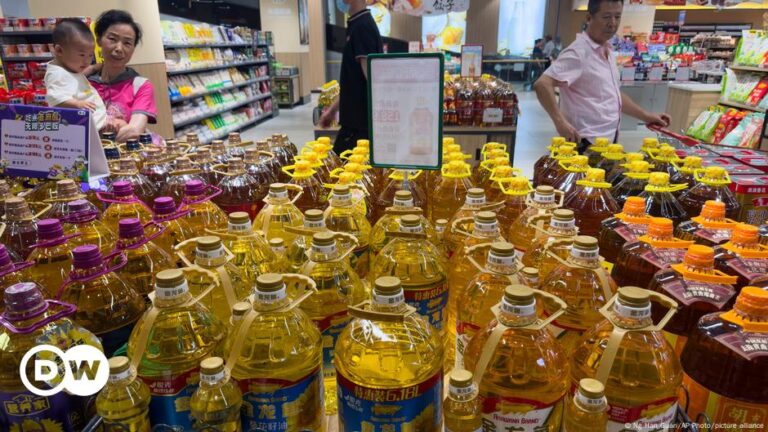The cooking oil contamination scandal that broke in China earlier this month has highlighted years of efforts to improve food safety practices.
The scandal was first revealed by state media. Beijing News The incident, which occurred on July 2, involves two Chinese companies that allegedly used fuel trucks to transport edible oil without cleaning it between loads.
Authorities announced a high-level investigation amid public outrage.
“The most important thing is to convince people that a similar incident will not happen again,” said the comment, which received thousands of likes on Chinese microblogging platform Weibo.
This is not the first national food safety scandal.
In 2005 and 2015, Chinese media exposed similar activities involving the illegal shipment of edible oil.
Another food safety issue identified by authorities is the use of “gutter oil” – cooking oil recovered from drains and grease traps that is sold cheaply to restaurants.
John Kojiro Yasuda, an associate professor of political science at Johns Hopkins University in Baltimore in the US who has studied China’s regulatory reforms, told DW that the incident shows that China is still “in the early stages of transforming its food system” despite decades of efforts.
“This is really a work in progress. It’s not something that’s going to be solved overnight,” he said.
Chemical tank used for edible oil
An investigative report into the latest scandal found that two tankers had been loaded with cooking oil for delivery immediately after transporting chemicals, a cost-cutting measure that had become an “open secret” in the supply chain, media reports said.
The two companies implicated in the report are state-owned transportation and storage company Sinograin and private conglomerate Hopeful Grain and Oil Group, which have launched their own investigations into the allegations.
“The edible oil transportation industry is essentially an unregulated mess,” Beijing News The problem stems from insufficient oversight of manufacturers and a lack of mandatory standards for transportation, he said in a video report.
China has guidelines recommending media specifically for vegetable oils, but these are merely “recommended” standards, leaving manufacturers room to cut corners, the editors reported.
Yanzhong Huang, a senior fellow on global health at the Council on Foreign Relations, told DW that switching between transporting chemicals and cooking oil is unacceptable, even if the tanks are cleaned between uses.
“Even if the toilet has been cleaned, don’t drink the water from it,” Huang said.
Further enforcement needed
Huang added that simply tightening regulations would not solve the underlying problems in China’s food safety system. China already has some of the strictest food safety laws in the world, the first of which came into force in 2009. It has since undergone several revisions over the years.
But Huang said stronger enforcement is needed.
China launched institutional reforms in 2018, abolishing the State Food and Drug Administration (CFDA) and consolidating agencies responsible for food and pharmaceutical products into a new agency directly under the State Council.
“This means its ability to regulate food safety has been undermined,” Huang told DW, adding that the Chinese government should have given the FDA authority beyond the central ministry level.
Yasuda told DW that other factors also need to be taken into account, given the complexity of China’s fragmented food market.
He said that apart from strict regulation and government oversight, it was crucial to have a “fairly vigilant consumer base that can aggressively punish non-compliance by food safety suppliers.”
Moreover, the number of food producers and distributors in modern China is “overwhelming,” so there is a strong need to modernize farms, he said.
“When you’re dealing with farms worth 150 to 200 million yen, it’s very difficult to monitor from the field,” Yasuda said.
Political pressure on Beijing?
China’s State Council Food Safety Administration promised that those responsible for any wrongdoing would be “severely punished.”
In 2008, two businessmen convicted of making and selling infant formula laced with the chemical melamine were sentenced to death, and the Food Safety Act was passed a year later.
Chinese leader Xi Jinping has repeatedly vowed to tackle the country’s notorious food safety problems since coming to power more than a decade ago, warning in a 2013 speech that the Communist Party’s legitimacy would be called into question if it “can’t even do a good job on food safety.”
But while Beijing says it considers food safety a priority, Yasuda questioned whether it was willing to “open the door to empower consumers and the media” to solve the problem.
Following the recent cooking oil scandal, Chinese media reported that an app that allowed users to track trucks within the country has been disabled. Beijing News It was discovered that the Weibo account of Han Taitao, the journalist who first exposed the fraudulent activities, had been deleted.
Editor: Wesley Rahn

